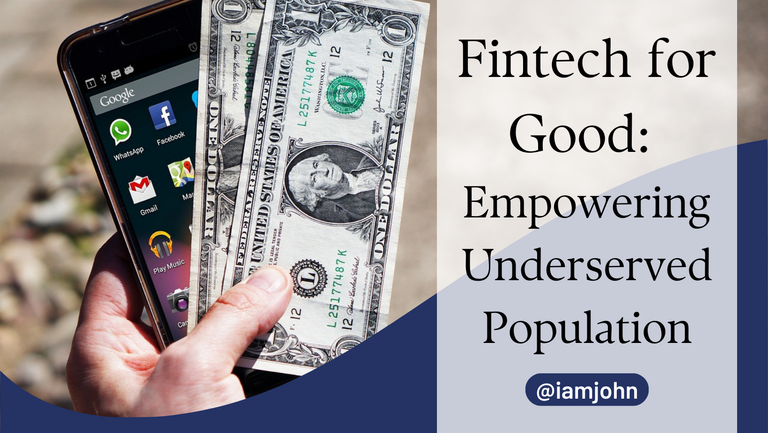FinTech has been a game-changer for many countries to reach the marginal community. No need to say, how inclusive it made the financial system and helped manage the weather better.
I can see the real change in my surroundings every day. The people who didn't know any ABC of banking, now have mobile banking and a savings account, and they deal transactions online. Even our parents have become much more financially updated and can access their wealth from their homes only because of the rise of FinTech.
Fintech, short for financial technology brought a wind of change globally, especially in the third world countries. Let's see what real-life changes I have seen and then discuss further.

made with Canva
According to the World Bank, as of 2017, 1.7 billion adults globally gained access to financial services through digital channels. In countries like Kenya, mobile money services like M-Pesa have brought millions into the financial system. The same goes for the Bkash app from Bangladesh This inclusion enables them to save, invest, and access credit.
Fintech platforms like Western Union and TransferWise have made sending and receiving remittances faster and more affordable. In 2020, India received $83 billion in remittances, largely due to fintech innovations.
Not only that, micro-investment apps have made it easier for low-income individuals to save and invest. In Bangladesh, Robi Axiata launched a mobile-based investment platform called "Robi Sheba" to facilitate investments in mutual funds.
One thing I need to say is that FinTech promisingly reduced financial scams and made a trusted financial sector where marginalized people can put their money and be the managers of their money.
You may have a little idea, of how things used to be in the past when there were no services like this!
In the past, individuals often entrusted their funds to unverified banking institutions, resulting in complete financial losses. Alternatively, they ventured into investment markets seeking higher returns but, lacking adequate education, often found themselves at a disadvantage in this arena as well.
It's well understandable how FinTech has changed the game. Now, noting is risk-free. Implementing such technologies in a place where the consumer has low knowledge of tech and finance, it's hard to manage.
For example, when the Bkash app first launched in Bangladesh; the first few years went into educating the mass generation about the risks of sharing passwords and pin codes. There were millions of reported cases of people losing their every penny in these password scams!
Regulating fintech in emerging economies can be complex. Providing data privacy at the same time regulating the global companies to implement at the local level is always a challenge. Countries like Pakistan have faced data breaches on mobile wallets.
But the good thing is, everything is manageable if we take the time. When people don't know 'what is password', now they are in a position to change their password on their own if needed. People used to stand in a queue for the whole day in my country Bangladesh to get different government benefits like Widow Allowance and Educational Scholarships. Now they get it automatically in their mobile bank through the FinTech apps.
This is how things change, we need to be passionate and do the right thing to bring the change.
In conclusion, I would say that fintech has indeed brought significant benefits to marginalized populations in third-world countries, expanding access to financial services. However, it also poses risks related to cybersecurity, data privacy, regulatory challenges, and potential exclusion. The risks are far lower than the benefits.
Balancing these risks and rewards is crucial as fintech continues to reshape financial landscapes globally for the better.
Thanks.
Posted Using LeoFinance Alpha